August 17, 2025 – Day 3 of Youth Camp, 18th Korean Minutemen for Peace and Unification Assembly
Hello. This is the third day of the Youth Camp with volunteers from the Special Youth Division of Jungto Society.
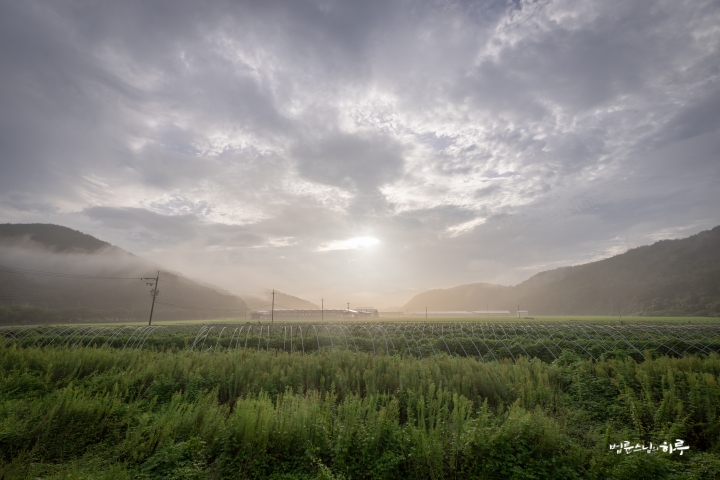
Sunim, who arrived at Dubuk Jungto Retreat Center last evening, started trimming grass on both sides of the village entrance road from 6 AM today. Although this area had been trimmed a few days ago, he trimmed it again to finish the job properly.
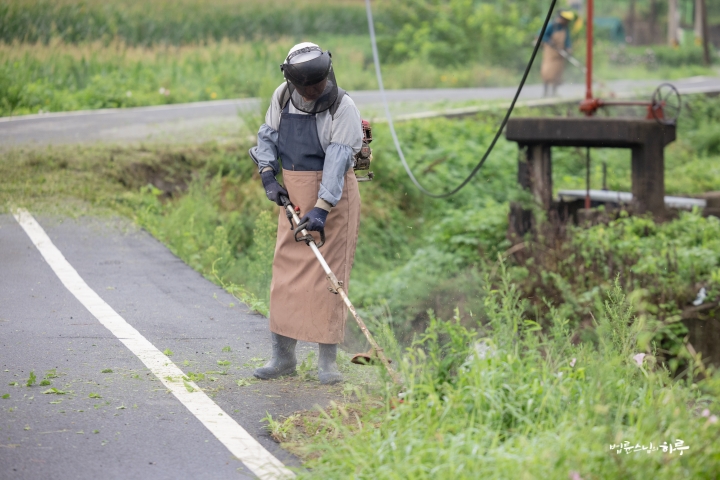
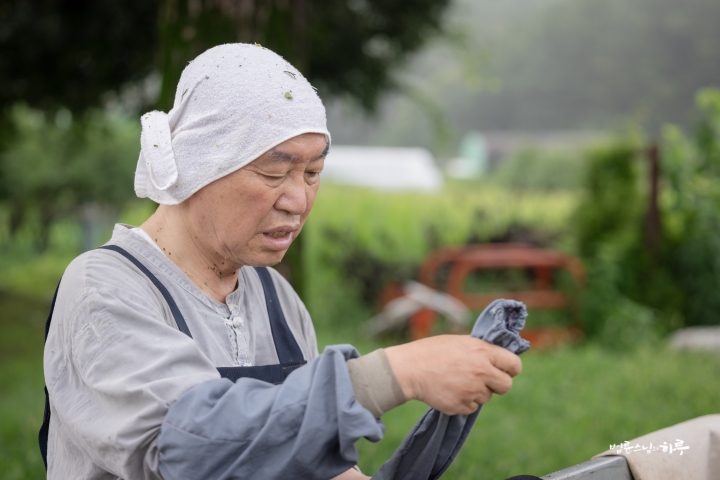
After breakfast, Sunim departed from Dubuk Jungto Retreat Center at 8 AM and headed to Seonyudong Education and Training Center in Mungyeong to participate in the Youth Camp again.
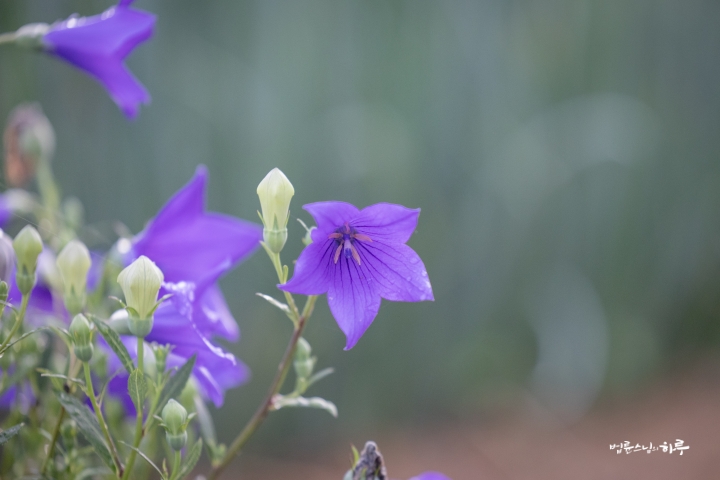
After a two-hour drive, he arrived at Seonyudong Education and Training Center at 10 AM and joined the Youth Camp.
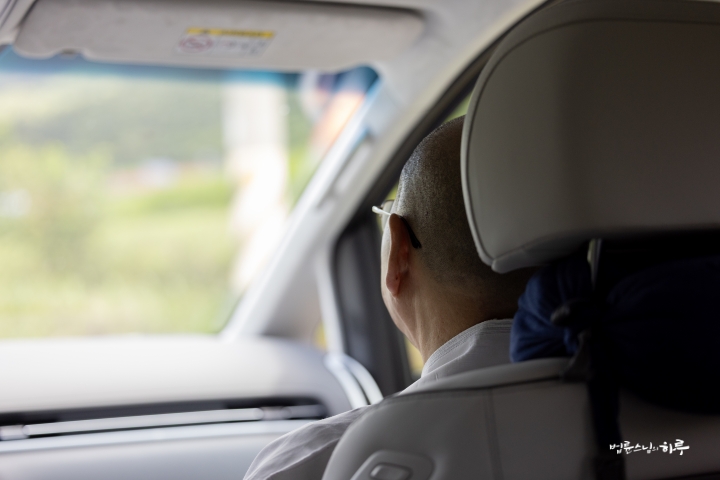
As the Youth Camp entered its third day, the conversations among the 50 volunteers from the Special Youth Division were becoming increasingly deeper. Early in the morning, they had time to establish a three-year business plan for the Special Youth Division and create their individual activity plans within that framework.
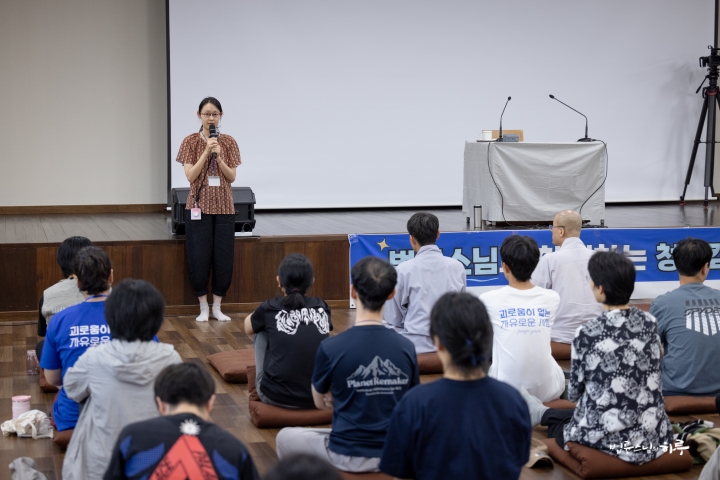
Starting at 10 AM, with Sunim present, they presented a draft proposal for the ‘2nd Phase of the 1000-Day Practice, Special Youth Division Organizational Restructuring’ and had a discussion session.
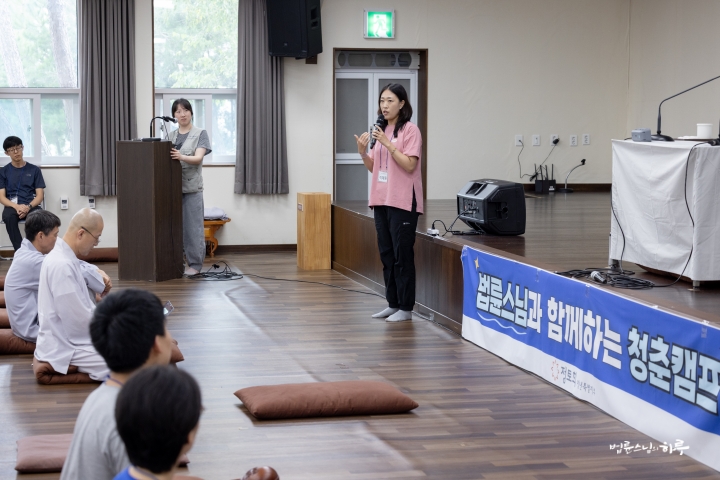
Youth volunteers freely came forward to share their thoughts on what they hoped would change in the Special Youth Division.
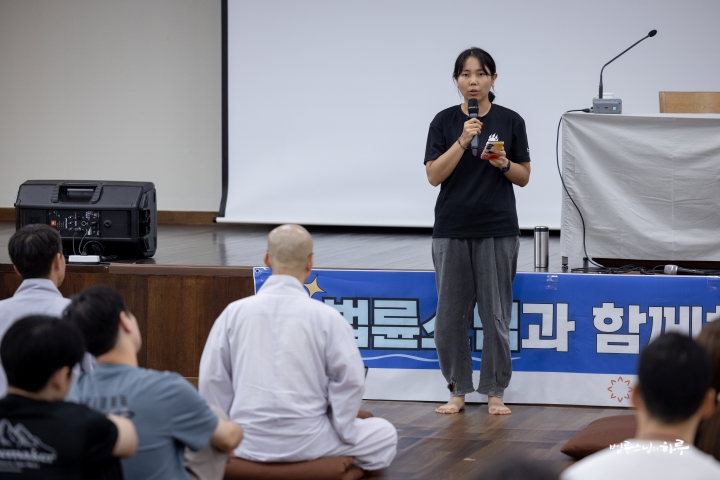
“I’ve always been disappointed by the lack of intergenerational exchange. I’d like to create welfare programs where young people can work together with elders. Rather than staying in youth-only spaces, we need a structure that allows natural transition through activities with the Lay Member Group. We also need to actively increase the influx of college students.”
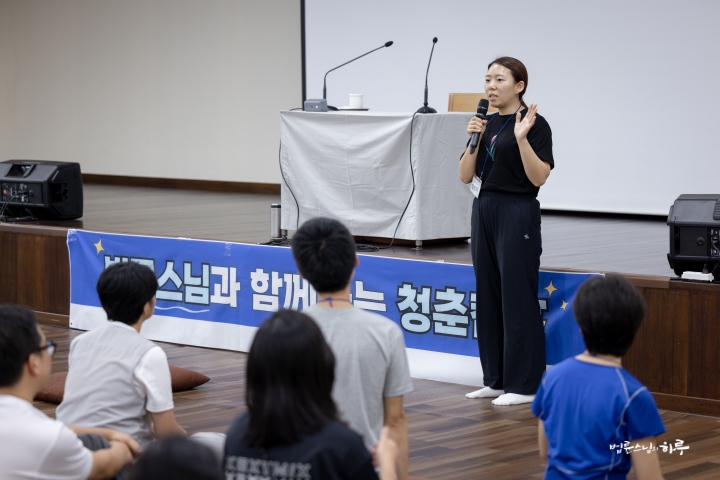
“Someday, the Youth Festa should go global too. I hope we can establish overseas branches to create bases for exchange with young people abroad.”
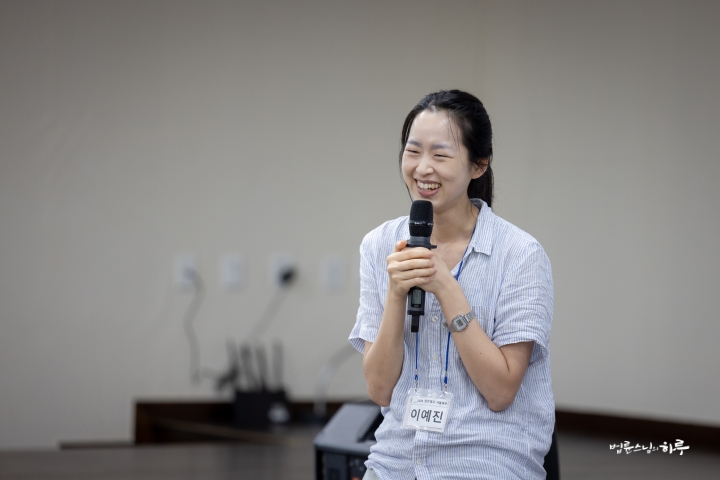
“I think volunteers will increase when we naturally connect volunteer work while practicing together. It would be good if we could lower the hurdles and increase experiential activities so young people can participate easily. The volunteer work young people are doing now is too limited to internal Jungto Society affairs. I hope we do more volunteer work connected to the outside, like delivering coal briquettes to low-income families or nutrition packages. Also, exchange with foreign workers will be important in the future. I think activities that understand their culture and work together are absolutely necessary.”
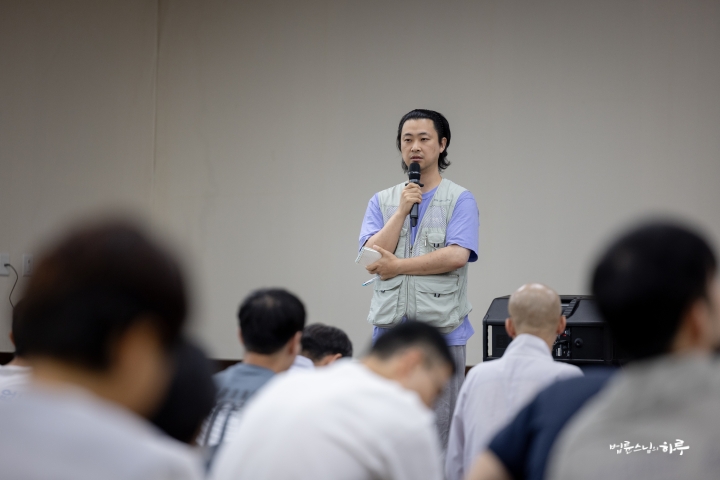
“I hope major projects like the Northeast Asian History Tour or Youth Festa have dedicated teams for stable preparation. Besides big events, I hope there are many small programs that the general public can participate in without burden. I’d also like to try new things like a Baekje history tour.”
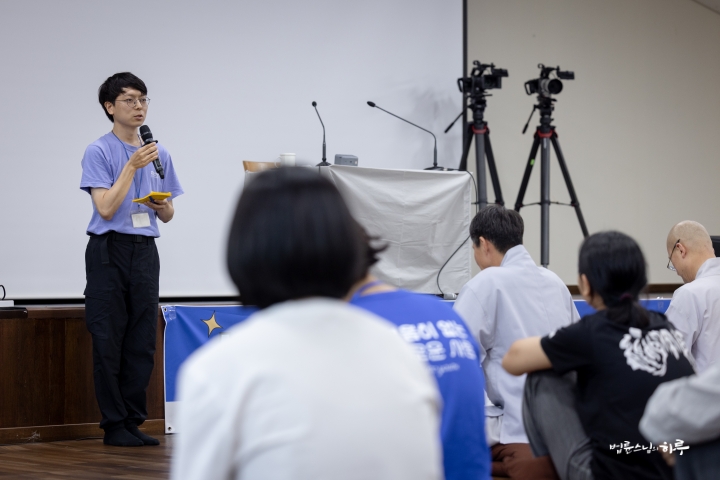
“It’s most effective to recruit volunteers right after they complete the Dharma School. We need a structure where youth facilitators take the lead in observing and recruiting. Rather than just focusing on increasing membership numbers, we need a structure that takes detailed responsibility for groups of 10 people.”
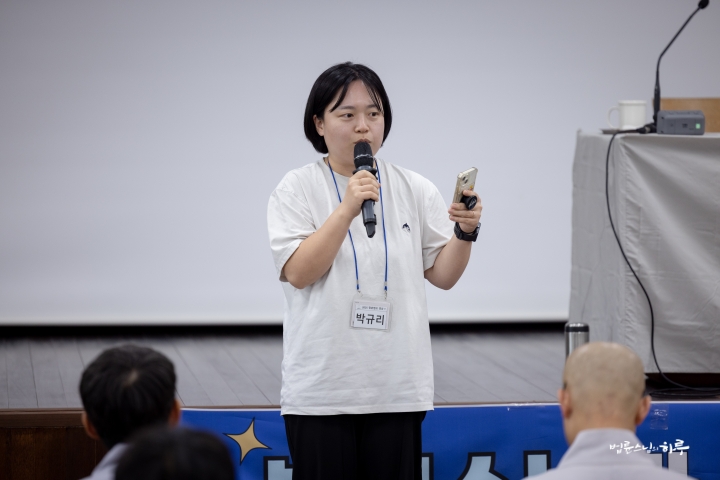
“Classes create better rapport when young people attend together. It’s better to do volunteer activities like farming or cooking together with older volunteers.”
Sunim listened attentively to the youth volunteers’ presentations from the back row.
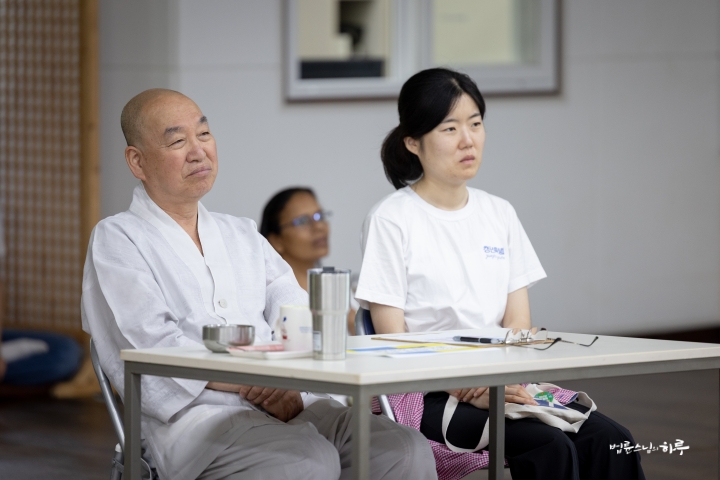
Though the suggestions were different, each word contained the young people’s desire to connect more broadly and act more independently. After an hour of presentations, Sunim finally came up on stage to add his thoughts on what the young people had presented.
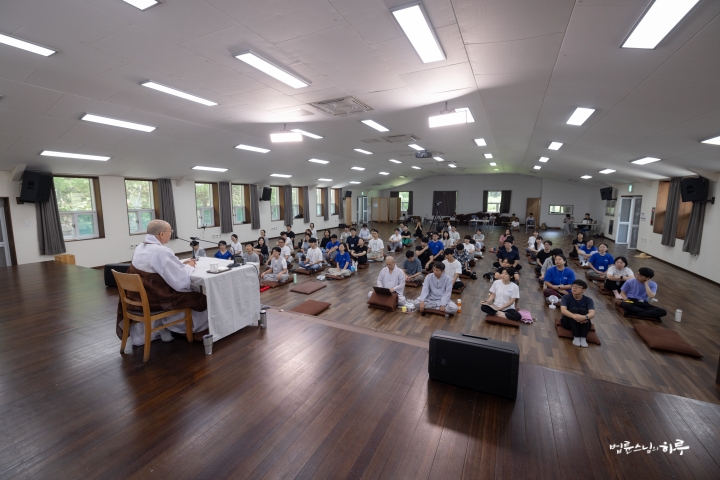
“I listened carefully to the stories that came from each of your experiences. While some opinions conflict with each other, if we coordinate these various views going forward, it will be of great help to the operation of the Special Youth Division.
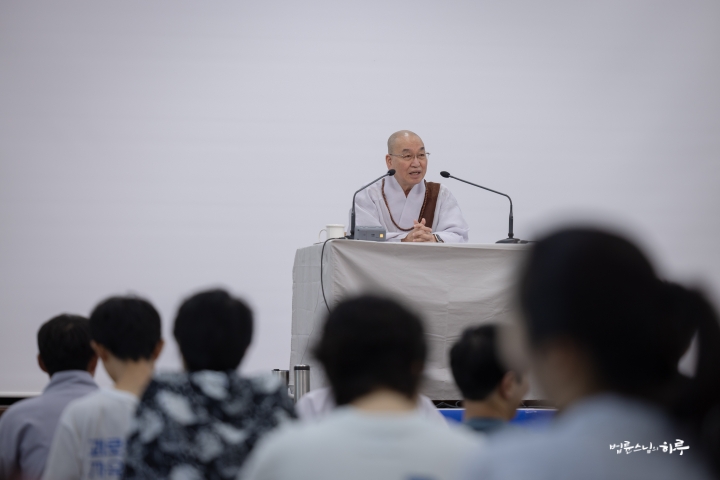
Youth Small Groups and Small-Scale History Tours Blooming in Various Regions
It would be good to regularize major youth events: the Gyeongju History Tour in spring, the Northeast Asian History Tour in summer, the Youth Festa in fall, and the India Pilgrimage in winter. However, among the presentations just made, there were also opinions that it would be good to have more diverse small-scale offline events in the regions. The suggestion was to frequently hold small-scale events with dozens of participants in local areas rather than large-scale events organized by Jungto Society or the Special Youth Division. For example, for history tours, we could plan tours with specific themes like the May 18 Gwangju History Tour, Jeju April 3 History Tour, or Donghak Peasant Revolution History Tour. In Seoul, we could visit historically significant places like the March 1st Movement sites, the Cheondogyo Central Temple, and Daegaksa Temple, which were key locations. Also, if we explore Goguryeo historical sites, while we can’t go on the Northeast Asian History Tour, there are traces of Goguryeo in the south as well. When Goguryeo was prosperous, its influence extended to Chungcheong Province, so there are good sites to visit like Achasan Fortress and the Jungwon Goguryeo Monument in Chungju. Planning small-scale events like this would be a good approach.
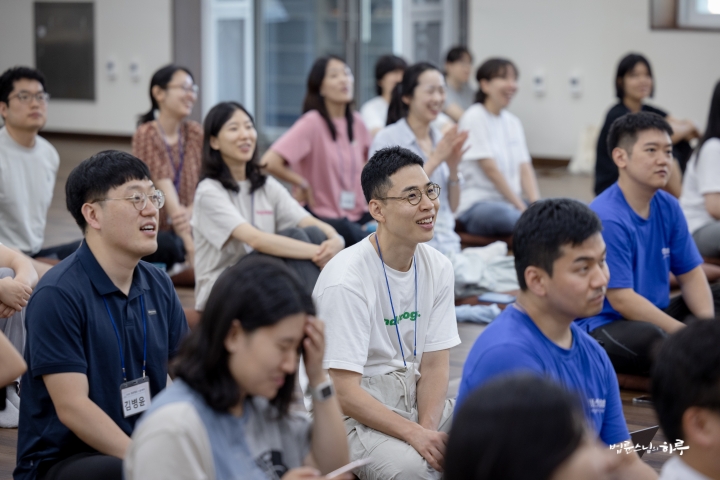
Activities are not limited to history tours but can also include climate crisis response activities or JTS activities. For example, young people in the Busan area can engage in exchange activities with foreign workers at the multicultural center in Dongnae, Busan on Sundays, participate in medical volunteer work in collaboration with the Medical Practitioners’ Jungto Society, or join programs teaching Taekwondo and Korean language. Supporting elderly residents at Dubuk Retreat Center is also a good option. Beyond simply delivering food or cleaning homes, having conversations with the elderly is meaningful. In this way, various small-scale activities can be developed.
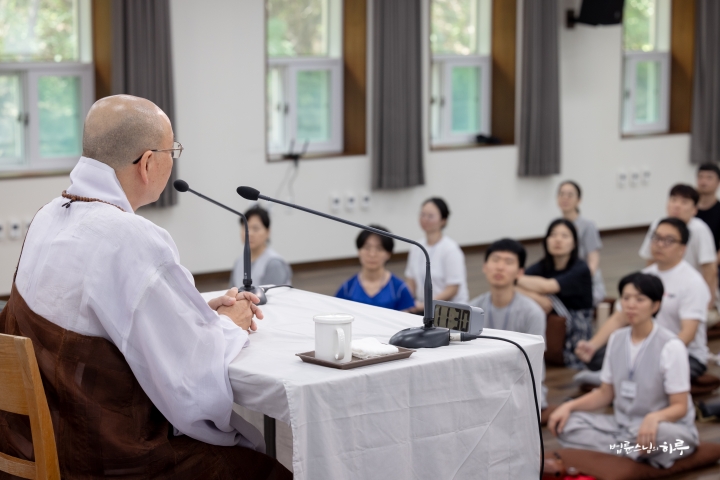
A Challenge to Solve Together: Stable Integration of Jungto Dharma School Graduates
The biggest challenge is how to manage new members who have graduated from Jungto Dharma School or Sutra Course and joined as members. Throughout Jungto Society, there is a problem with new members who graduate from the school and transition to the membership system not settling well into groups. To solve this, it would be good to develop a method where one group facilitator manages new members as a separate group for six months. Instead of immediately integrating them into existing member groups, the concept would be to operate a ‘semi-Dharma School’ or ‘semi-Sutra Course’ program with intensive management for six months before assigning them to regular groups. During this period, operations can be flexible, such as reducing miscellaneous announcements during Weekly Dharma Assembly and extending sharing time. Listening to your presentations, I realized the need to improve the system and research efficient organizational management methods so that those who graduate from the school can stably settle into Jungto Society.”
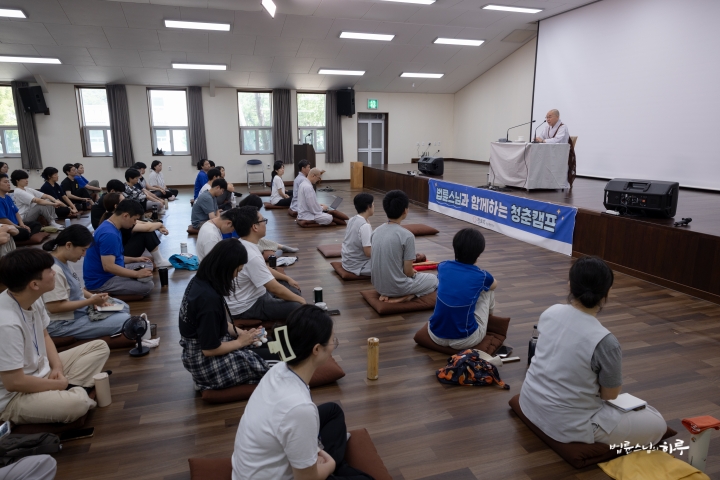
When lunchtime arrived, Sunim concluded the morning program after this conversation. After a light lunch, Sunim headed to the broadcasting room at Mungyeong Retreat Center to conduct a live broadcast for the Tongil Euibyung Assembly.
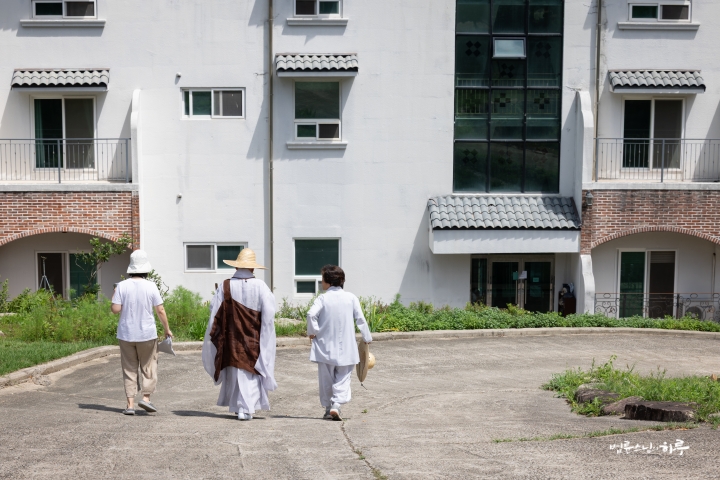
The young people spent time writing reflections and doing a major cleanup starting at 1 PM, while Sunim participated online in the 18th Tongil Euibyung(Korean Minutemen for Peace and Unification or KMPU), Assembly.
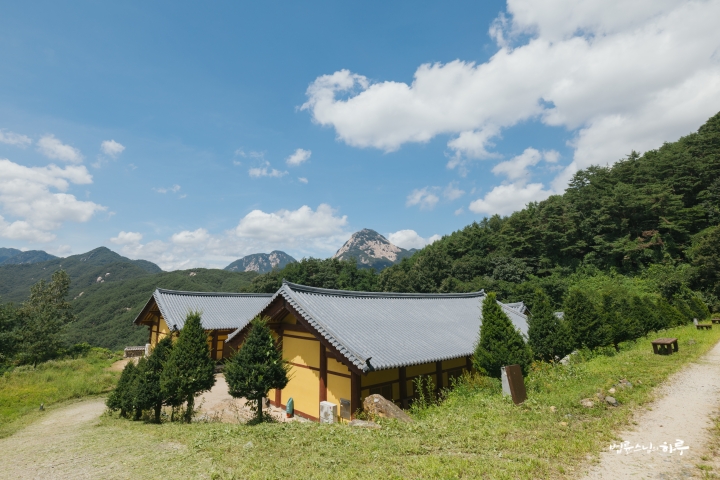
107 Balsim Practitioners who had completed the Tongil Euibyung training course entered the video conference room, and with senior Tongil Euibyung members connected via YouTube, they began the Tongil Euibyung Assembly by reciting the Words for Practice together.
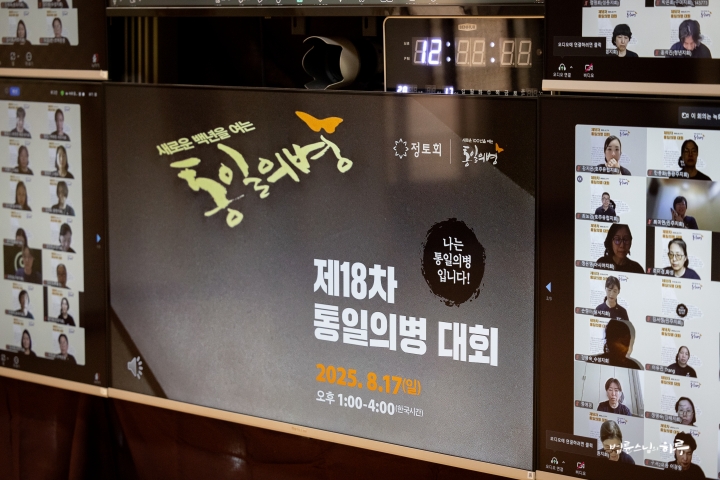
When the assembly requested a Dharma talk with three bows, Sunim explained the purpose behind creating Tongil Euibyung and then spoke about the mindset that Tongil Euibyung members should have.
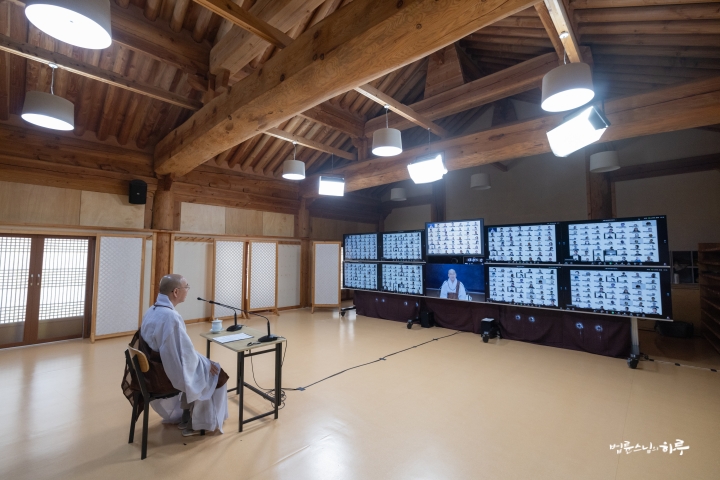
“As citizens of the Republic of Korea, without the spirit of a republic where ‘the people are the masters of the nation,’ one cannot become a Tongil Euibyung member. Based on this republican spirit, Tongil Euibyung must historically inherit the spirit of the Donghak Revolution and carry on the spirit of the righteous armies that rose nationwide to protect the country at the end of the Korean Empire. We must also inherit the spirit of the independence movement that fought to reclaim our nation and the spirit of the March 1st Independence Declaration, as well as the legal tradition of the Provisional Government of the Republic of Korea established on this foundation. Furthermore, we must have a perspective that supports democratic states where citizens are the masters and democratic citizen revolutions.
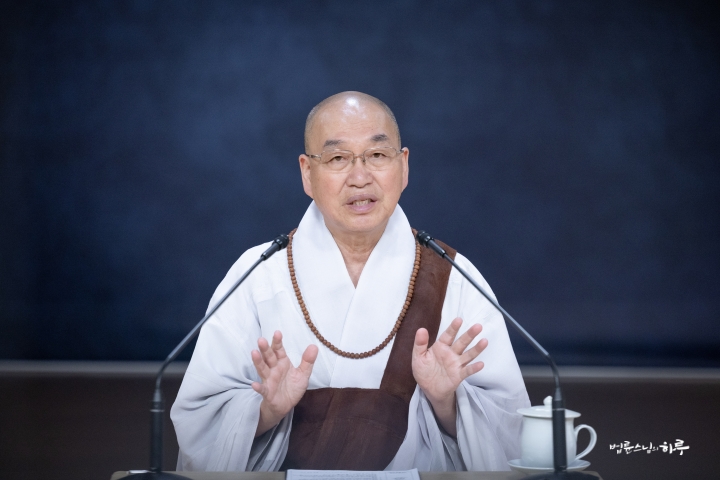
Tongil Euibyung must embrace all independence movements that fought to reclaim our nation, regardless of whether they were nationalist or socialist, or where they operated, be it in Korea, China, or the United States. What matters is the fact that countless people stepped forward to engage in activities to regain sovereignty from Japanese colonial rule. The perspective is that individual thoughts and religions are left to individual freedom.
The Path Forward for Tongil Euibyung: Inheriting the Legacy of the Righteous Army
Historically, from the Damul righteous armies that arose to reclaim lost ancient lands after Gojoseon fell to China’s Han Dynasty in 108 BCE, through the Goguryeo-Balhae restoration movements, to the righteous army movements during the Japanese invasions of Korea, this land has always had the spirit of righteous armies. Righteous armies refer to people who stepped forward to defend the country when it was in crisis, even though defending the nation was not their inherent duty. At that time, like today’s national military, there were government troops whose job was to defend the country, and it was their duty and profession to risk their lives defending the nation in times of crisis. Government troops were provided with salaries, authority, weapons, clothing, and training. However, ordinary citizens had neither such duties nor authority. Nevertheless, when government troops were defeated in war or abandoned the country and fled, these were the righteous armies who, as masters of this land, took up arms on their own to fight against invading forces, despite being unskilled and lacking expertise, regardless of any obligation. Righteous armies mean ‘righteous military forces.’ Strictly speaking, they were not military forces, but they played the role of the military, and this was the driving force that protected the country.
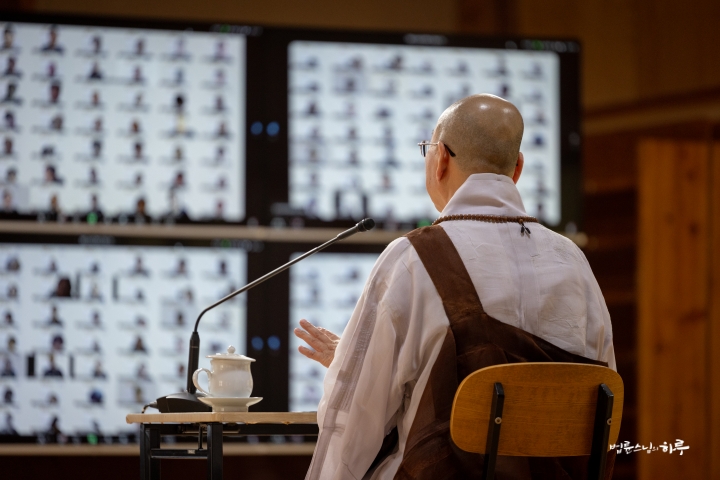
We were unable to defeat the Japanese invaders and achieve independence on our own, and gained independence with some external assistance. As a result, immediately after liberation, the country was divided due to the interests of the powers that had helped us. Unless the divided nation is unified, it is difficult to say that true liberation and genuine independence have been achieved. However, what is more important than national unification now is preventing war from ever happening again. We do not agree with the argument for achieving unification through war. Work intended to save lives must never become a means of harming people. Unification must be achieved peacefully. Even if the process takes longer, it must be pursued peacefully, and even if the unification is somewhat incomplete, the process must be considered more important. What we pursue is peaceful unification, not ‘unification supremacy’ that insists on unification even through war. This contradicts Buddhist philosophy.
North Korea is our counterpart for unification. Even if North Korea is currently the most hostile and threatening entity with the potential for war against us, it remains the only partner with whom we can achieve unification. Therefore, we must resolve our hostile relationship to prevent war with North Korea under any circumstances. To this end, we must pursue reconciliation, exchange, and cooperation between the South and North. Even if the process of becoming one takes a long time, it must be done peacefully. In this process, we must work to ensure that our North Korean compatriots are guaranteed the right to live with human dignity. When they are hungry, we must help them; when they are sick, we must provide medical care; and when their human rights are violated, we must support the protection of their rights. Although we are not yet one family, we must do what we can for their survival and happiness, as they are people who will soon become one family with us.
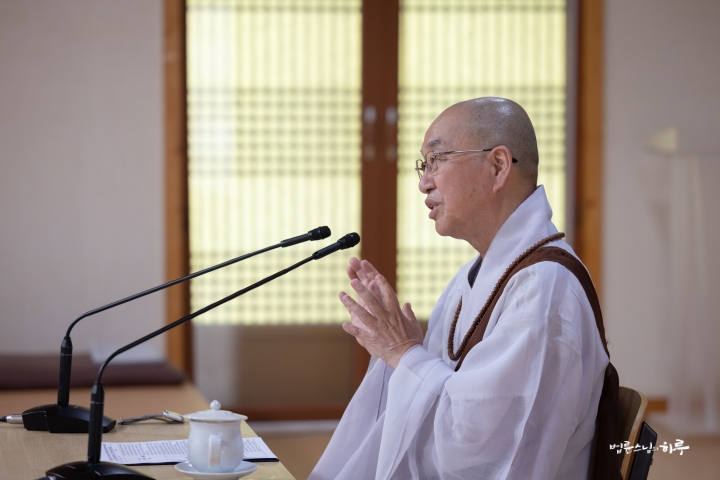
To maintain peace, strong defensive capabilities are needed to prevent enemy invasion. At the same time, efforts must be made to reduce hostility so that the other side has no intention of fighting us, and dialogue, reconciliation, and cooperation must be pursued. Neither dialogue nor defense takes priority over the other – both are needed simultaneously. For this reason, the Korean Minutemen for Peace and Unification (KMPU) must not be swayed by political ideologies such as progressive or conservative, nor should they become affiliated organizations of specific political parties. They must not be subordinated to specific politicians or political forces. However, if any political force or politician seeks to maintain peace on the Korean Peninsula, they should be strongly supported regardless of party or ideology. If they pursue peaceful unification rather than unification by force, they should likewise be supported. While we are independent entities, we will support anyone who moves toward peace and unification, regardless of religion or political ideology. Our goal is to maintain peace without war and achieve unification.
Furthermore, if it helps alleviate the suffering of North Korean residents, we will help them even if we face criticism or sacrifice. We must actively engage in humanitarian work that saves lives, including humanitarian aid for North Korean residents, relief for North Korean refugees, and support for their settlement in South Korean society. The KMPU must clearly maintain this perspective.
KMPU Members Who Act Immediately When Given a Mission
Therefore, when a mission necessary for maintaining peace and achieving unification is given, we must move in perfect order like an army without questioning this or that. If there are issues, they should be raised after completing the mission. Only then can we demonstrate our strength as minutemen. Minutemen are a ‘righteous army.’ When you carry out missions as KMPU members, you must have the attitude of soldiers, not individuals. However, such missions are not always activated but are given only in moments of crisis when absolutely necessary.
Throughout history, minutemen normally farmed, traded, and studied, but when the nation was in crisis, they set aside their occupations and fought. However, people tend to forget activities that are not routine. If members are called up only once every five years, some may not even remember that they are minutemen.
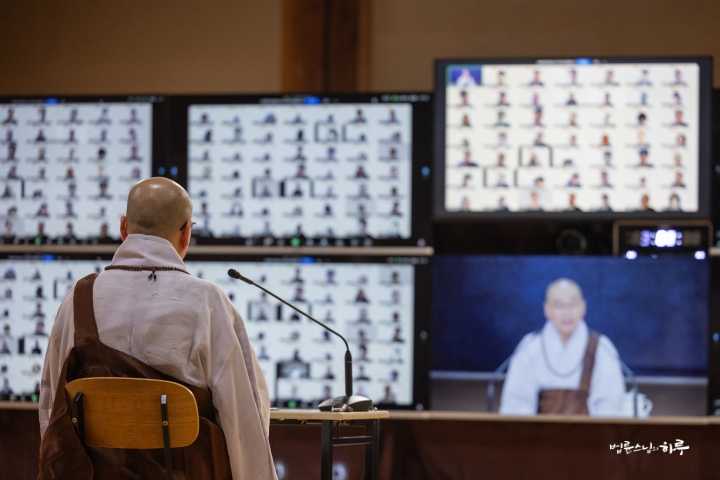
As new minutemen, you must make your commitment starting today. You need to be ready to immediately understand and respond even if there is an emergency call-up five years from now. Some call-ups may come without prior notice, with no time for discussion. While other Jungto Society projects go through democratic procedures, remember that KMPU missions must be acted upon immediately when they are suddenly given. It would be best if no mission is given until unification is achieved. However, missions can be given at any time when a crisis situation arises. You must have the awareness and pride that you are descendants of the Damul Army from 2,000 years ago.”
The prospective KMPU members completed their leading member training and received history education five times to become KMPU members. Seven people pressed the hand-raising button to have a conversation with Sunim about questions they had during the learning process.
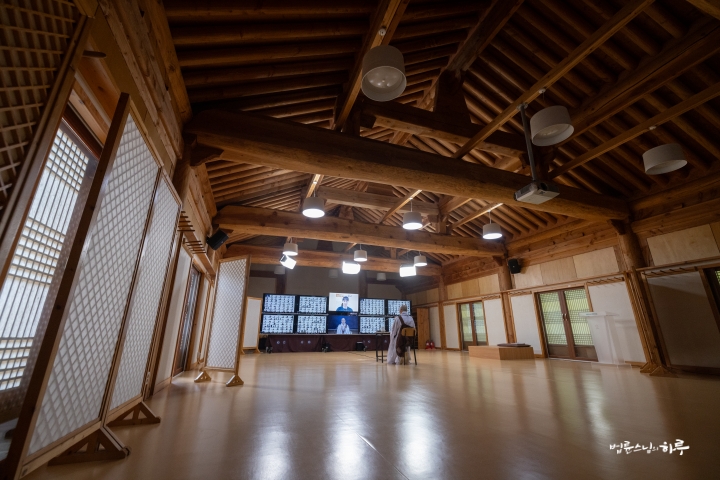
There were many serious questions about perspectives on peace, unification, and history. One of them asked what strategy the Korean government should establish for peace on the Korean Peninsula in the future, as the U.S. and Korean governments focus on their respective issues ahead of the Korea-U.S. summit.
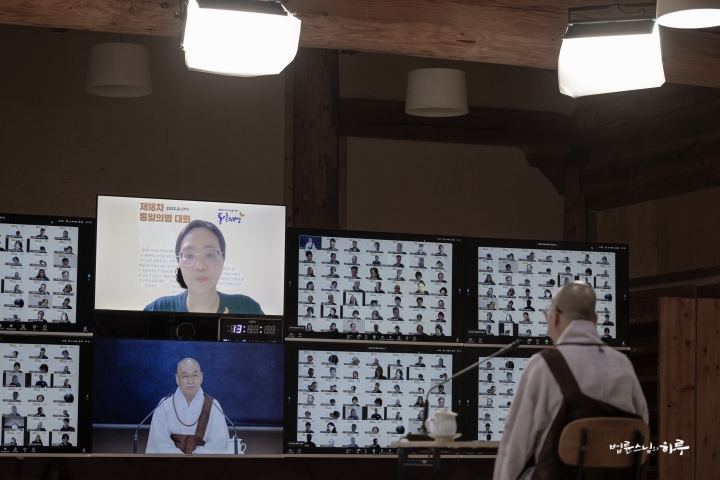
Ahead of the Korea-U.S. Summit, What Strategy Should Korea Choose?
“The current situation is not easy. What the U.S. will demand first from the Korean government will not be North Korea issues or economic issues. The biggest challenge will be whether Korea will firmly side with the U.S. when America engages in hostile competition with China in the future. In other words, there will be pressure that the Korea-U.S. alliance and U.S. Forces Korea, which have dealt with North Korea until now, must train and respond against China in the future. There will also be demands for not only U.S. Forces Korea but also some Korean forces to participate if problems arise in Taiwan.
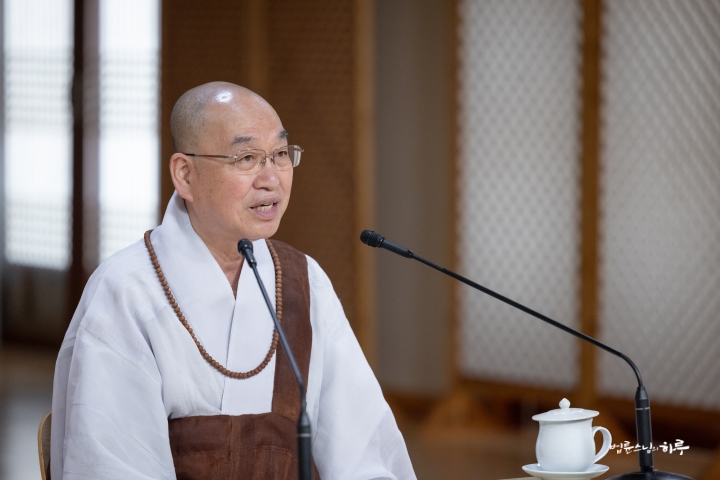
Thus, the United States’ top priority is containing China. If Korea explicitly declares its participation, relations with China will deteriorate, but it’s also difficult to openly refuse. This will be followed by pressure to increase defense spending and share the costs of U.S. forces in Korea, and there will also be discussions about how much Korean companies, such as the shipbuilding industry, will contribute to the U.S. defense industry.
The Korean government will request reducing military exercises to ease tensions between North and South Korea, but the U.S. is likely to respond by saying, ‘We’ll do that, but in return, participate more in other exercises.’ These discussions won’t be made public but will take place behind the scenes. If we accept U.S. demands as they are, conflicts with China will intensify, and if we refuse, conflicts with the U.S. will grow – it’s a difficult situation. This is an unavoidable challenge regardless of who the president is. Ultimately, we’ll have to partially accept U.S. demands internally while externally appearing to appropriately defend our position.
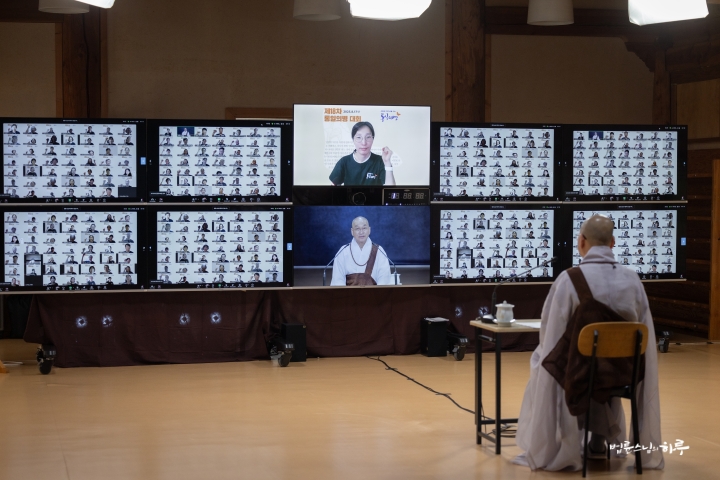
I think the Korean president should say this to the U.S. president regarding the North Korean issue:
‘It has been 72 years since the Korean War broke out, but the war has not yet ended. Neither Nixon, Clinton, nor Obama could end the war. This historic task can only be resolved by you, President Trump.’
By elevating President Trump in this way, we might be able to achieve some results. If the U.S. moves to improve U.S.-North Korea relations, Korea should say it will actively support the U.S. By facilitating U.S.-led improvement in U.S.-North Korea relations, we can alleviate U.S. suspicions about Korea’s progressive government and reduce criticism from domestic conservative forces that ‘this government is being led by North Korea.’
As you mentioned in your question, it’s concerning that U.S.-North Korea dialogue might be delayed due to America’s complex issues. Just look at the Ukraine war. Russia says it will end the war if given the Donbas region, but the Ukrainian president will find it difficult to make such a decision easily, as he cannot avoid national criticism if he gives up territory. Historically, this is a region where many Russians live, but it is currently Ukrainian territory according to national borders, so Russia’s invasion is clear. Europe values the current border order, so they worry that once boundaries are shaken, endless conflicts will follow. Even in such complex circumstances, if the Russia-Ukraine war can be concluded, there’s a possibility that U.S.-North Korea dialogue could resume.
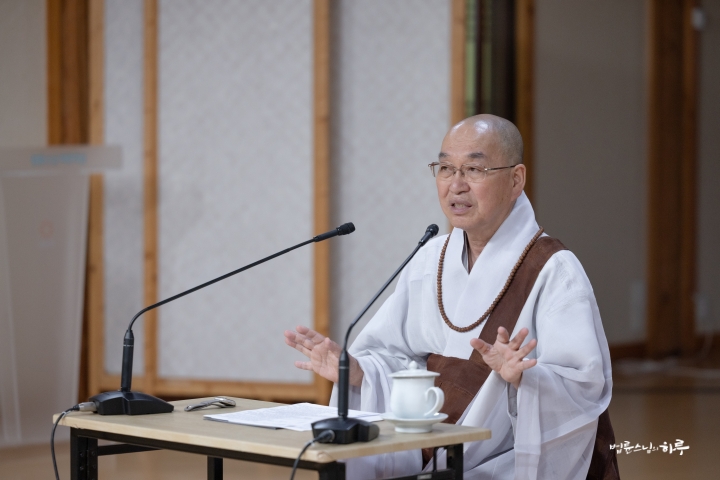
Even between North and South Korea, although North Korea’s rhetoric is harsh, there is still room for dialogue. North Korea says ‘there’s no need to sit down with South Korea,’ but that’s just because they’re upset. Their attitude can change anytime if necessary. Since North Korea isn’t bound by public opinion, they can reverse today’s statement tomorrow without any problem. So there’s no need to take North Korea’s statements at face value and conclude that inter-Korean relations are over. We should continue taking measures to ease tensions in our own way. Rather than silence, if words are exchanged even if they’re harsh, there’s a possibility for dialogue. While it’s not easy to dramatically improve inter-Korean and US-North Korea relations quickly in the current situation, we can see that the possibility for both relationships to gradually progress through dialogue remains open.”
“Yes, thank you. I understand well.”
Questions continued one after another.
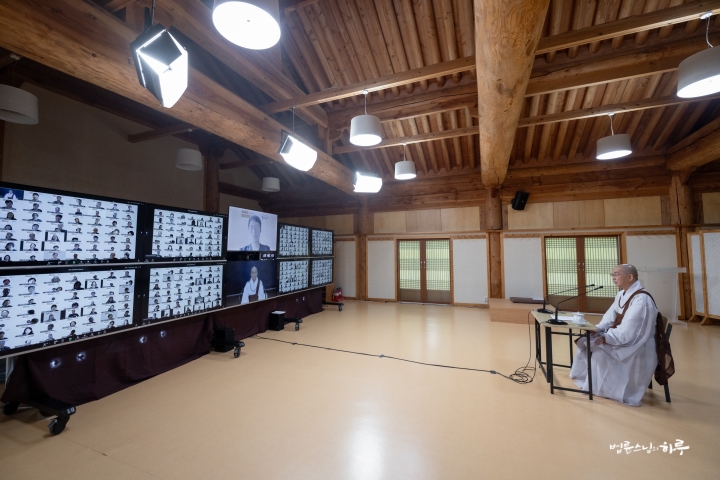
These days, unification feels distant and I wonder if we should start with cooperation first. In this era, is the approach of actively advocating for unification still appropriate?
What conviction did you have to overturn existing education and start new history education?
In an era where education that distorts history is emerging, what perspective should the Tongil Euibyung have?
The name ‘Tongil Euibyung‘ might sound too passive. How should we view this activity? Why aren’t there specific action items for unification like there are for environmental practice?
What is the Tongil Euibyung Assembly, and with what attitude and mindset should we participate as Tongil Euibyung?
Unification feels like both hope and gaslighting at the same time. As practitioners, how should we view and practice ‘unification’?
The questions from the assembly members who completed the Tongil Euibyung education commonly contained fundamental questions about how to view unification and with what heart to practice it.
Next, they watched videos containing the 10-year history of Tongil Euibyung and a progress report on Tongil Euibyung education.
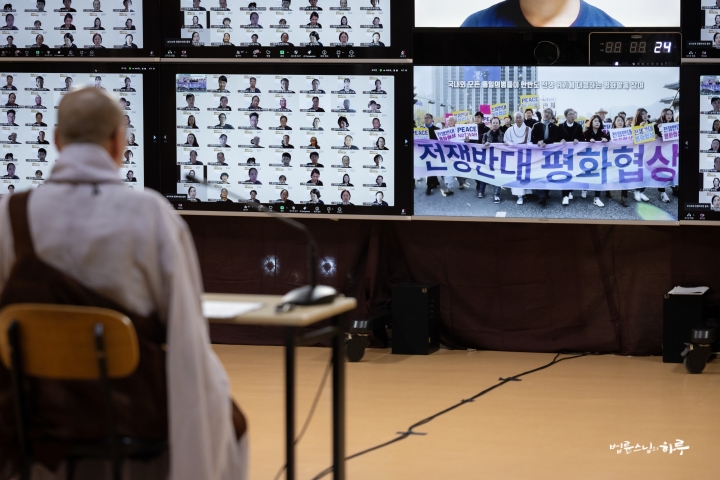
Next was the Tongil Euibyung appointment ceremony. First, Sunim presented an appointment certificate to one person representing the new Tongil Euibyung members.
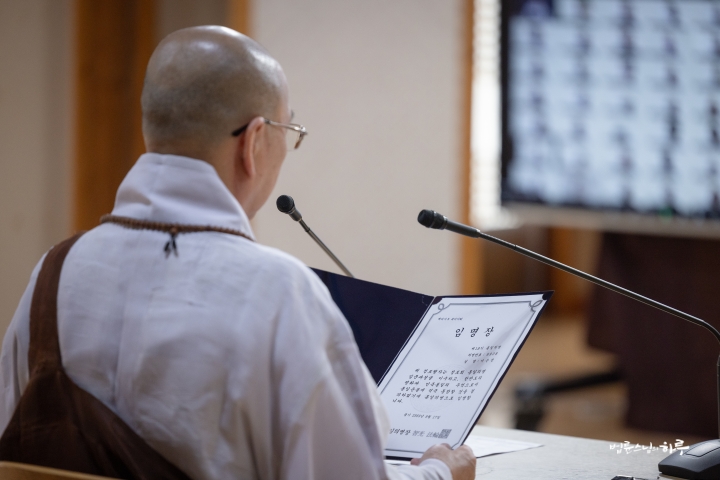
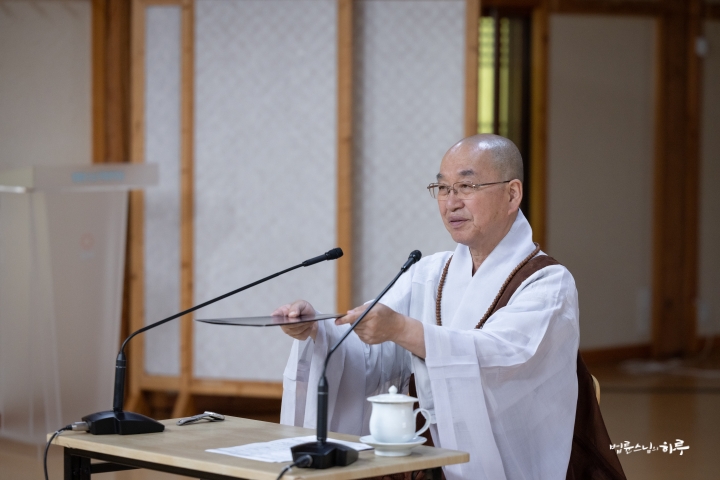
“The above Jungto practitioner has completed the Tongil Euibyung introductory course and resolved to actively participate in the unification movement as a leader for peace on the Korean Peninsula and national unification, and is hereby appointed as a Tongil Euibyung member.”
Sunim then presented appointment certificates to all the new Tongil Euibyung members.
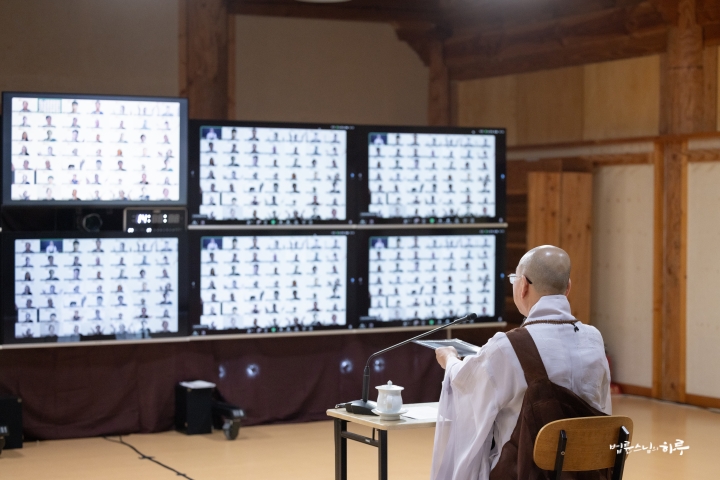
Senior Tongil Euibyung members welcomed them with loud applause. Sunim then offered a blessing for the new Tongil Euibyung members.
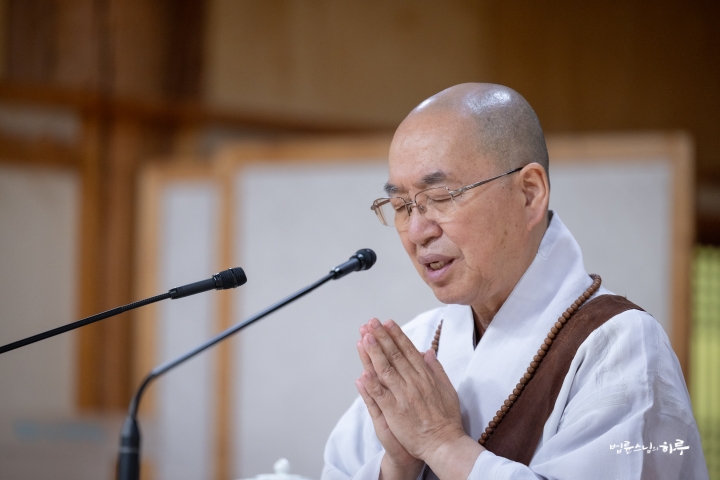
“Tensions are rising on the Korean Peninsula right now. If war breaks out between North and South Korea, or among surrounding powers, not only will millions be sacrificed and refugees created, but the achievements of industrialization built over the past half-century will be destroyed all at once. Today we are witnessing the horrors of war in Ukraine and Gaza. If war breaks out on this land, the damage will be far greater. Therefore, today we Tongil Euibyung resolve that for any reason, war must never happen again on this land.
We Will Prevent War and Preserve Peace
The Buddha reconciled people fighting over water issues and enlightened King Ajatasattu, who was about to attack a neighboring country, about the importance of peace, thus preventing war. Likewise, we will enlighten the leaders of this country and world leaders that war is absolutely unacceptable, and achieve peace without war. Furthermore, we vow to resolve the hostility between North and South, promote reconciliation and cooperation, and finally achieve the day of national unification.
May all Buddhas and Bodhisattvas bear witness so that our vow may be fulfilled, and may all heavenly beings and dharma protectors safeguard us. Please bestow your blessings so that all 107 Tongil Euibyung members who have made this commitment today may be physically healthy and mentally clear, living lives that bring happiness to themselves and benefit to others. We too will do our utmost to fulfill this wish.”
Next, all Tongil Euibyung members gathered their will and recited the Tongil Euibyung pledge together.
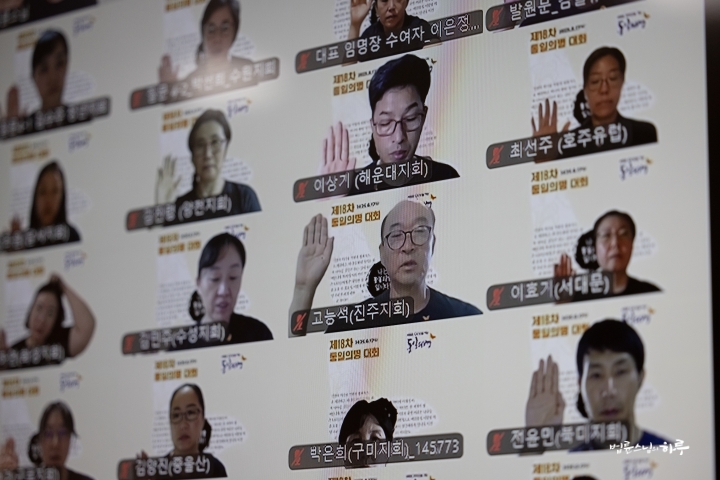
One. We will establish a peace system on the Korean Peninsula where there will never be war again.
Two. We will open the era of unification that will determine the next 100 years.
Three. We aim for an East Asian community that coexists with neighboring countries…
Finally, they recited the vow and concluded the Tongil Euibyung Assembly by powerfully singing ‘Our Wish is Unification,’ gathering their hearts for unification.
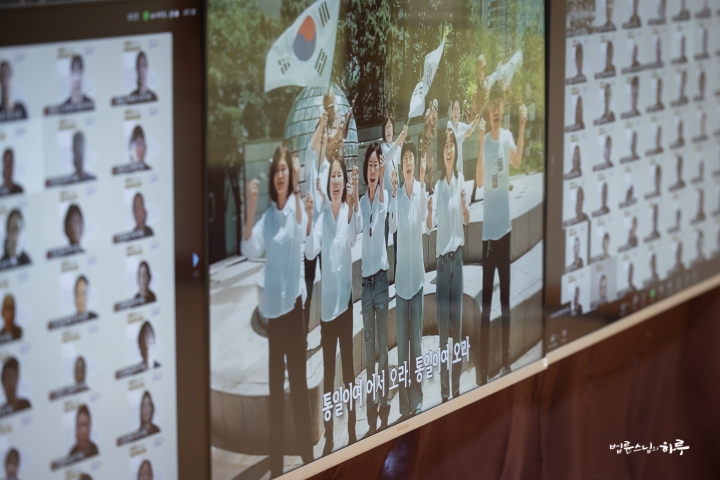
The new Tongil Euibyung members gathered in video conference rooms by group to continue mindful sharing, while Sunim left the broadcast room and departed from Mungyeong Jungto Retreat Center to return to Seonyudong Education and Training Center.
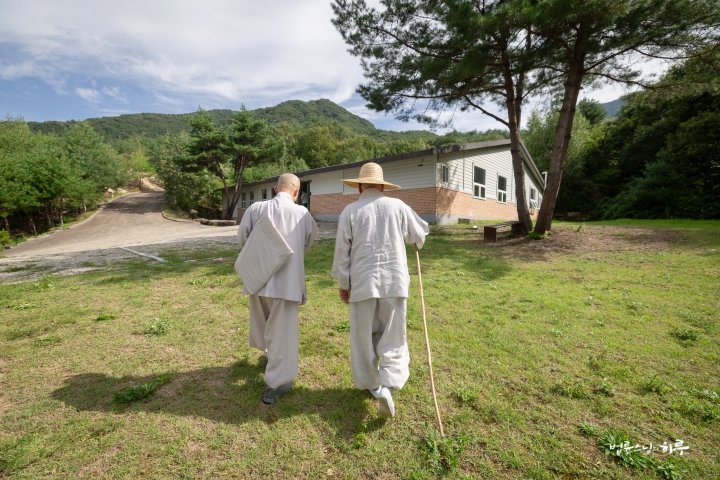
From 3 PM, everyone gathered in the main hall to conclude the 3-day youth camp with a time for sharing reflections. One representative from each group came forward to share their reflections.
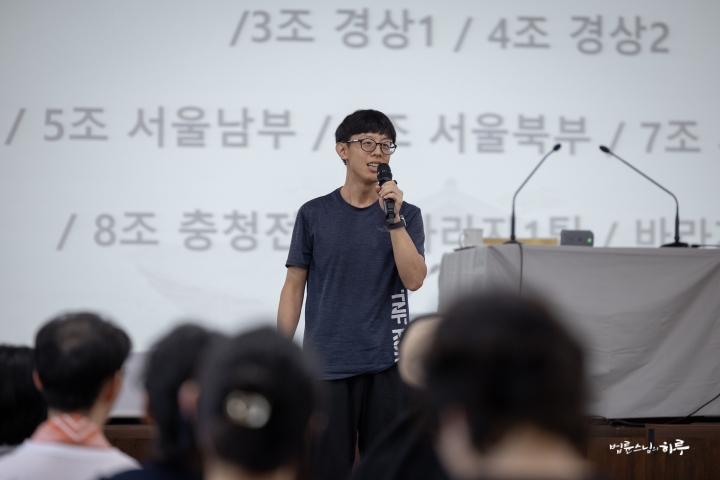
“My heart raced and I felt excited while listening to the Dharma talk. The perspective on things and vision for the world were transmitted directly to me. I was amazed at how easily and clearly you explained dependent origination, and I imagined ‘Did they listen to Dharma talks like this 30 years ago? Is that why the Dharma teachers made their vow?’ It made me want to live that way too. I was happy and joyful to fill this time with fellow practitioners. Whether in 3 years or 30 years, I want to continue living as a proud Jungto practitioner.”
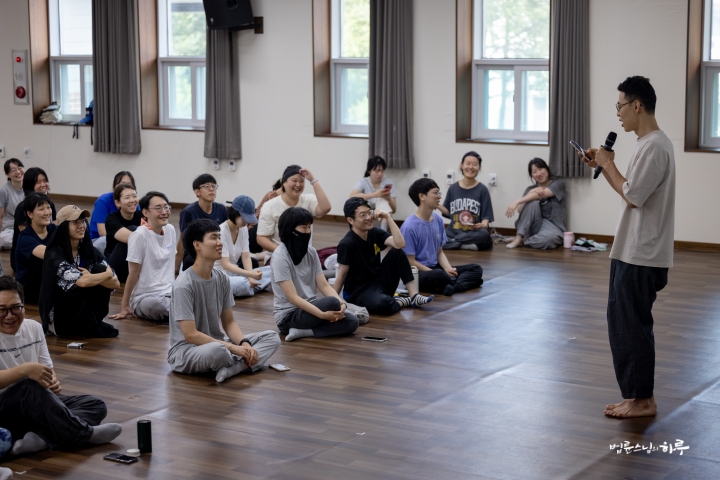
“It was a time when I could feel the energy and strength of young people, and listening to the guiding Dharma teacher’s words, I was moved to tears realizing how important the spirit of youth is. I’m grateful that I too can be used well as a young person, even if just a little. When I overslept on the last day and was late for morning practice, I once again felt that ‘taking care of myself is most important.’ I resolved to live a life that is well-used in the world, even if I don’t stand out and remain hidden. I’m also truly grateful that I could fully participate in the camp thanks to fellow practitioners who took care of the meal service.”
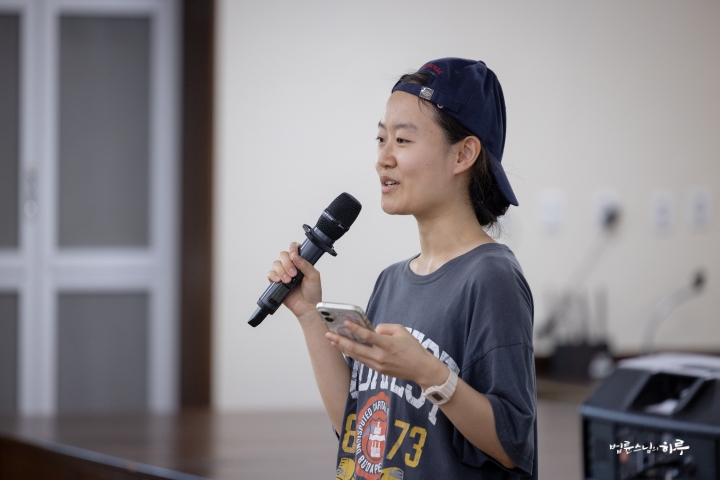
“While participating in meal service, I realized that I had never been grateful to all those who cooked for me throughout my life. Only now did I understand what great effort it is to plan menus, order ingredients, and prepare food. If I hadn’t come to this camp, I might have lived my whole life without knowing gratitude. At first, Jungto Society activities felt heavy, but doing them with fellow practitioners is more fun than I thought. Someday when I look back on this time, I think I’ll feel ‘It was really fun, rewarding, and I’m glad I came here.'”
Many young people shared their feelings of excitement about the Dharma talks, gratitude for fellow practitioners, and desire to humble themselves and be useful to the world.
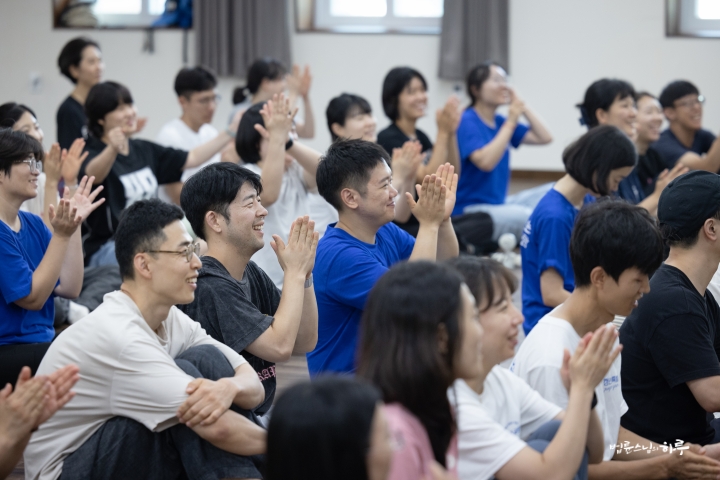
Sunim also listened attentively to the young people’s reflections and shared in their joy.
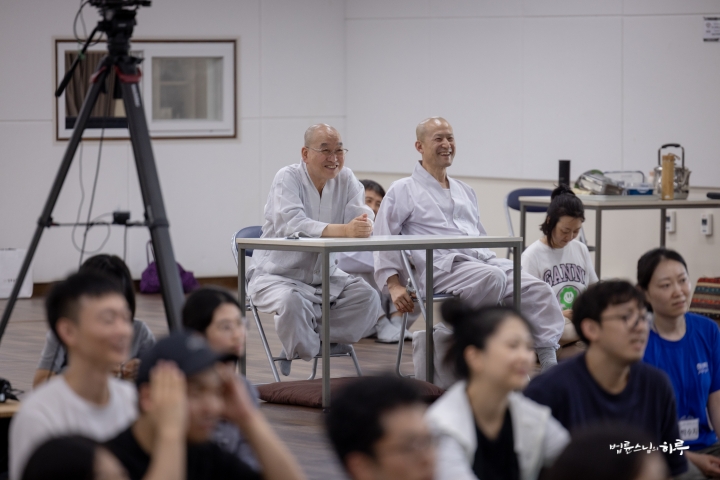
This youth camp seemed to become another starting point for young practitioners stepping toward the future. After finishing the reflection presentations, the young people requested a closing Dharma talk from Sunim with three prostrations.
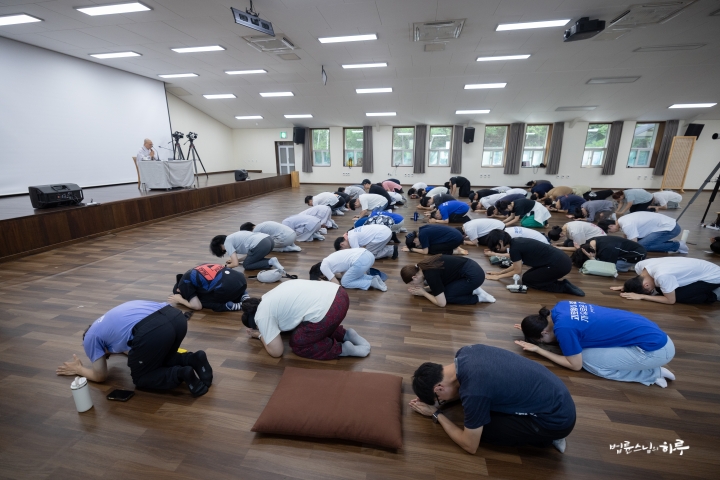
Sunim offered words of encouragement for the young people who might feel burdened by preparing for the Youth Festa event.
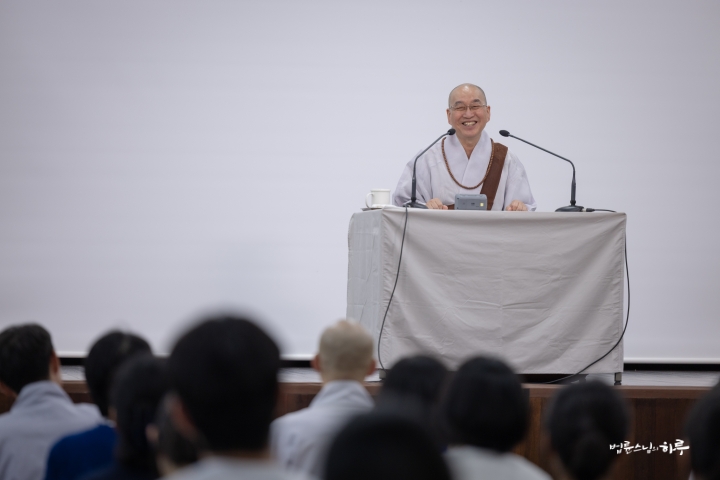
“It feels like we just had the opening ceremony, but three days have already passed. They say when you find meaning in something and immerse yourself in it, you lose track of time. I hope these past three days have been such meaningful time for you too. I also was able to develop many new ideas while staying here and listening to your stories.
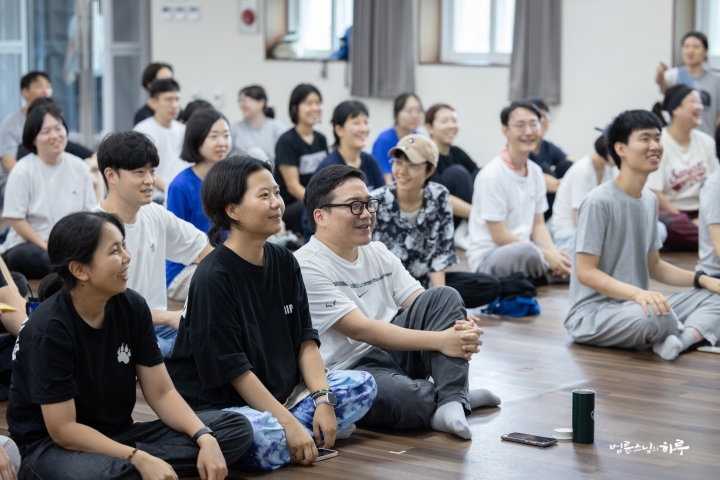
Chaos Brings Greater Growth Than Comfort
Just because the world we live in is chaotic doesn’t mean it’s necessarily bad. While we don’t need to deliberately create turbulent times, a chaotic world can actually create creative people. Of course it’s nice to train comfortably in today’s good environment, but when the Dharma teachers were your age, they trained in vinyl tents. The week spent leveling the ground and preparing was difficult at the time, but ultimately became an asset in life and shaped their character.
The reason people born in today’s good environment aren’t very different from those born in difficult environments in the past is because difficult environments aren’t necessarily bad. If you overcome them, you ultimately achieve greater growth. It’s nice to eat delicious food when someone cooks for you, but there’s also joy in shopping at the market and cooking yourself. When parents hear their children are coming home, they shop at the market from morning and prepare food. They feel even greater joy seeing their children eat deliciously. It’s because they’re happier seeing their children eat than eating themselves. If you love someone, cooking for them and cleaning to welcome them also becomes joyful work.
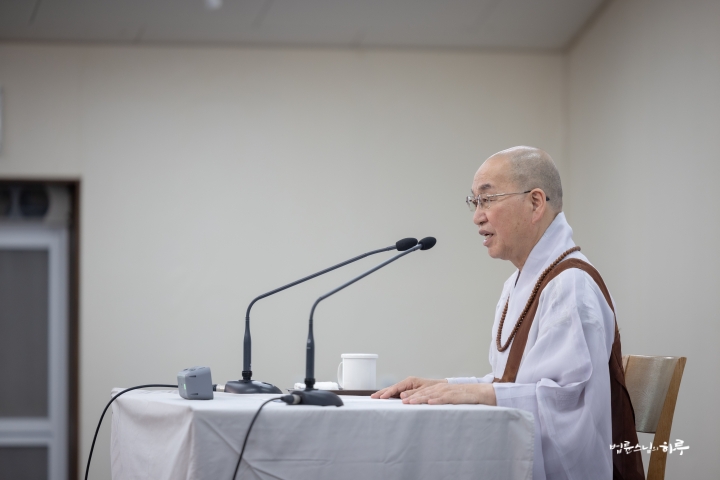
However, we are always accustomed only to the joy of gaining, striving to gain more, and then suffering when we don’t get as much as we want. To break this vicious cycle, we need to experience the joy of caring, the joy of giving, and the joy of pioneering. Then it becomes easier to understand others and we learn more. This kind of joy is not like a drug that disappears in an instant, but becomes a lasting memory. Whether it’s a personal matter you’re facing, work assigned at your job, or Jungto Society activities, when doing any task, rather than backing away saying you can’t do it, you need an attitude of willingly trying as much as you can. There’s no need to be afraid or intimidated in advance. Try anything as an experience.
This is different from being greedy for work. If greed is taking on more work than you can handle, then willingly trying the work given to you is an attitude without fear. Even if the result isn’t complete, it’s not a failure. The participation itself becomes an experience, and you gain confidence that even young people can move the world when they unite their will.
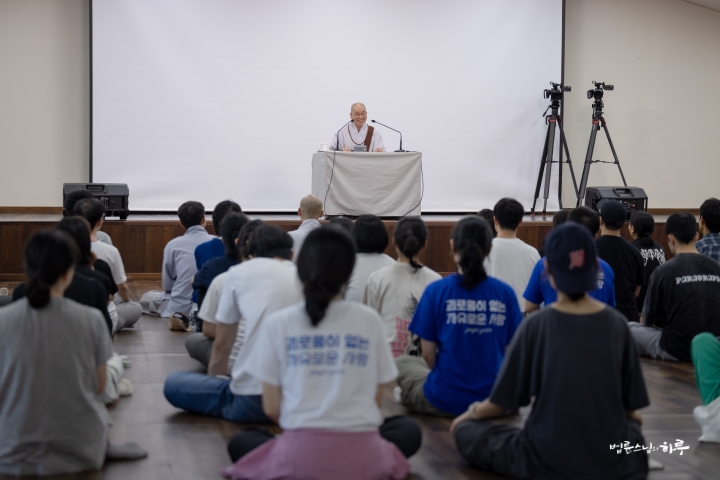
Youth Festa: There Is No Failure, Only Challenges
If we gain experience through this Youth Festa and expand its scale, we can give great hope to young people and potentially create a model at the national level. Even if we don’t receive the response we expect, we will still have valuable experience. The important thing is not to be attached to the results. That doesn’t mean we should prepare carelessly. We must do our best so that we can gladly accept any outcome.
You might feel a bit burdened. You have a lot of work at your job, your parents might oppose it, and on top of that, you have your existing Jungto Society activities – you might worry whether you can handle it all. However, confidence comes from accomplishing things that seem impossible. Even in wars, when you look at victories achieved with small forces, they always challenge what seems impossible. You grow to the next level by climbing cliffs no one else has climbed or pioneering paths that seem impossible.
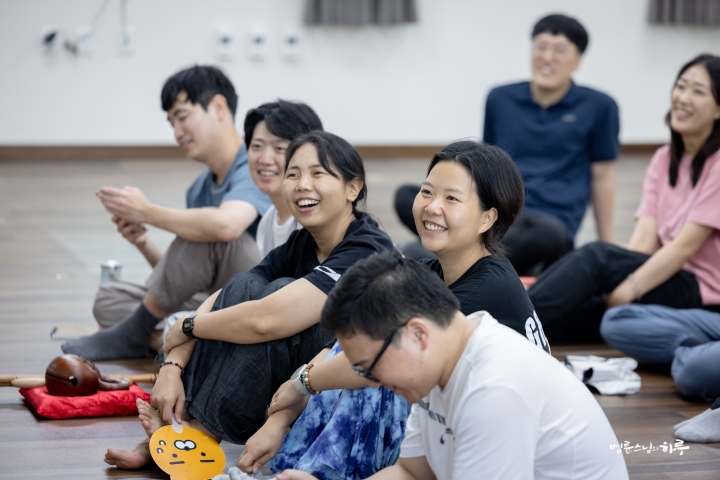
If greed takes the lead, you might only face failure. This happens when your eyes look far ahead but your feet aren’t touching the ground. Conversely, there are people whose feet are on the ground but whose eyes only look at their own feet. You need to be someone who looks far ahead while always keeping your feet on the ground, taking one step at a time. Since budget, space, and manpower are not unlimited, we need to focus and make choices to achieve maximum effect with limited resources. Let’s prepare for this Youth Festa with that in mind.
Since the Youth Festa is organized by Jungto Society and operated by the Special Youth Division, the entire Jungto Society will support it if needed. If young people don’t gather despite all our promotion efforts, we also have the option of inviting Jungto Society members and making it a Jungto Society celebration. During the June 13 Ten Thousand People Dharma Assembly, ten thousand people gathered at Jangsu Jukrim Temple in just one day.
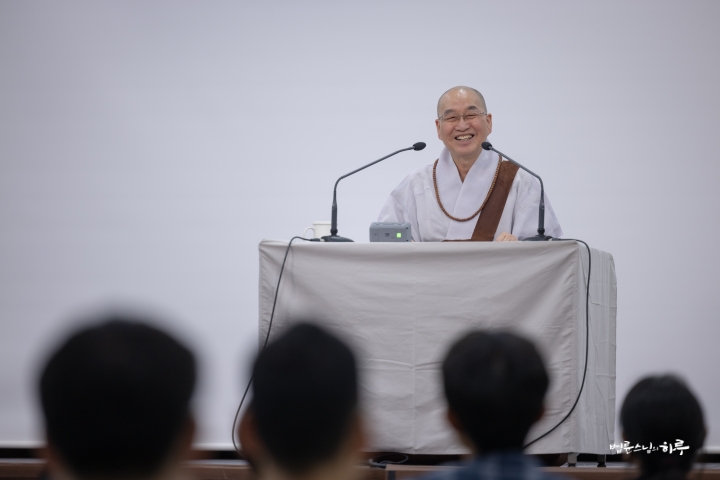
So there is no failure. The issue is whether the content is substantial, not failure itself – we’ve already burned our bridges. If each Jungto Society member brings just one young person under 35, we can gather 5,000 people. Since we’ve prepared for both the worst and second-worst scenarios, let’s freely pursue our goal of gathering 10,000 young people. This isn’t about judging success or failure. There is no failure in Jungto Society’s work. In Jungto Society’s history, it’s extremely rare for something we’ve created to disappear. Even if we couldn’t develop further, we’ve always maintained what we started. We’ve never started anything with money, and we’ve grown from nothing. Don’t feel too burdened – since we’ve burned our bridges, please challenge yourselves freely. Thank you all for your hard work over these three days.”
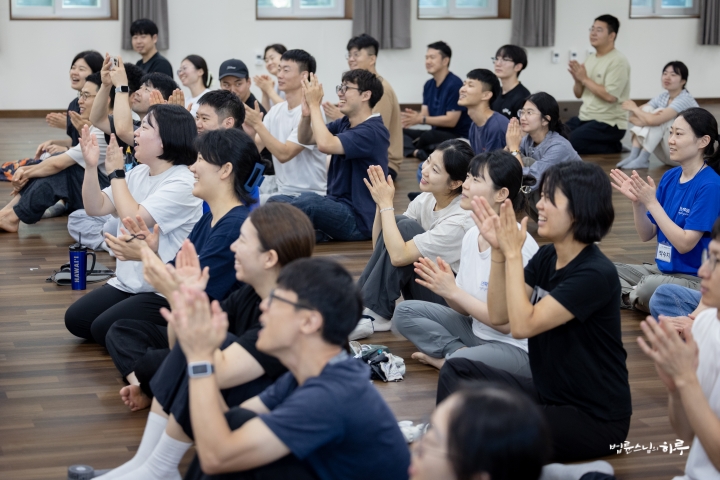
Everyone then stood up together to recite the Dharma propagation vow. Led by Park Soo-jung, the head of the Special Youth Division, they read aloud line by line in strong voices.
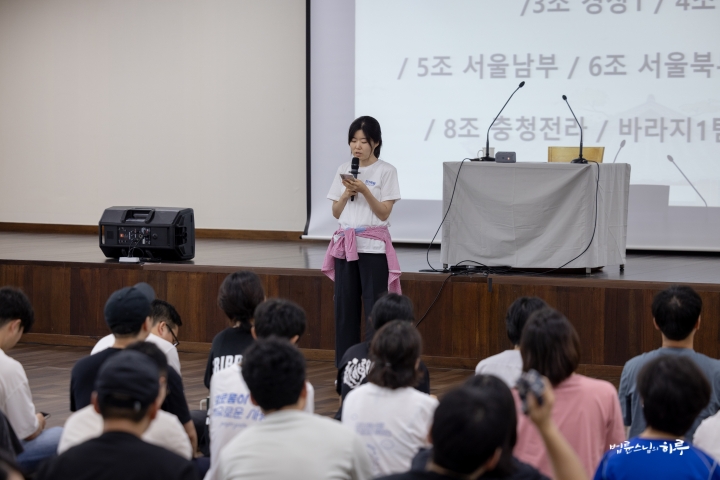
“Now we will do it. Knowing that we are people free from suffering and truly free, we will revive our spirit and become seeds of hope so that young people living in the same era can also live without suffering. No matter what difficulties come, we will not lose our sense of ownership and will accomplish this.”
Then everyone shouted together in loud voices:
“Jungto Youth! Raise your spirits!”
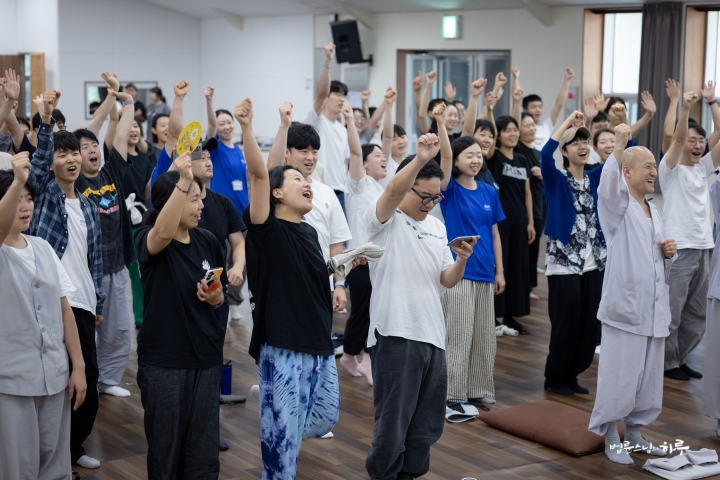
Hot applause and cheers followed, turning the venue into a festive celebration marking a new beginning.
Finally, there was time to introduce the staff who volunteered behind the scenes to make the three-day Youth Camp possible. As each person was called by name, loud applause poured forth.
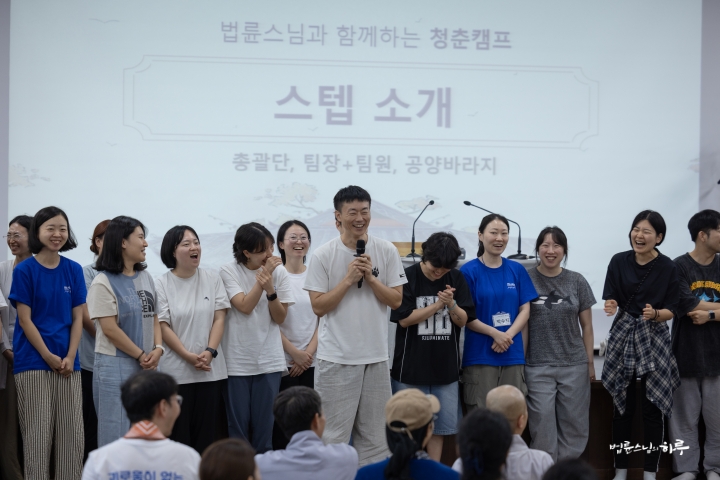
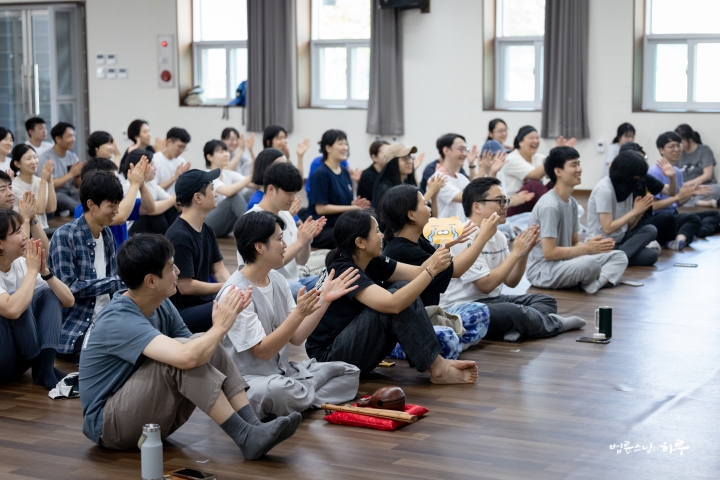
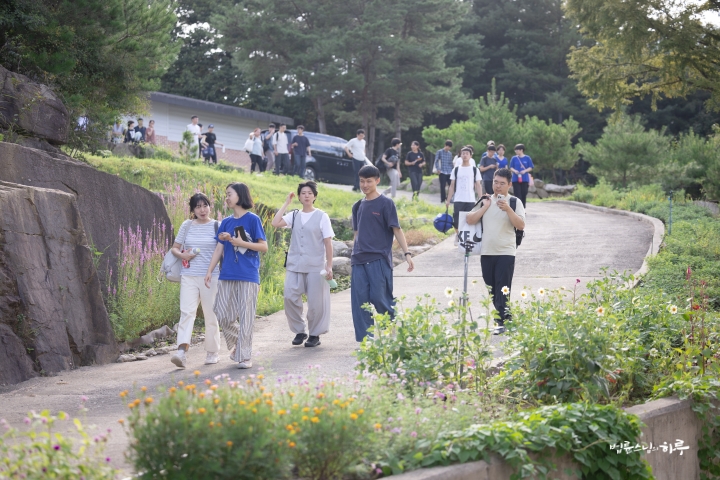
After concluding the Youth Camp with the Four Great Vows, a commemorative photo was taken on the steps in front of the training center building.
“Jungto Youth! Raise your spirits!”
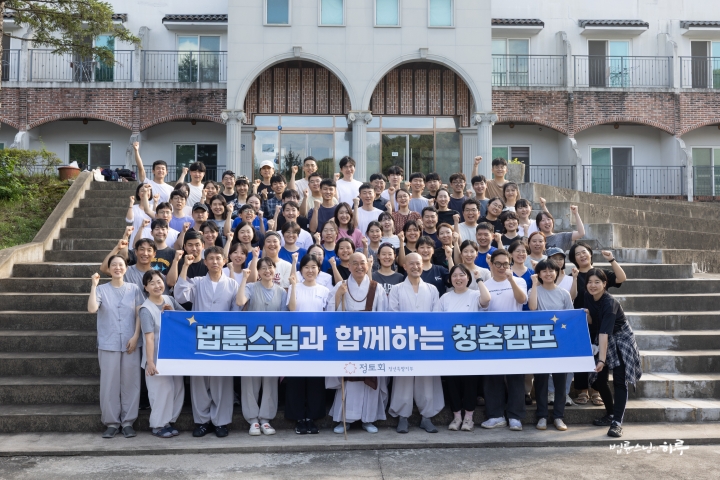
As the powerful chant echoed, bright smiles spread across everyone’s faces.
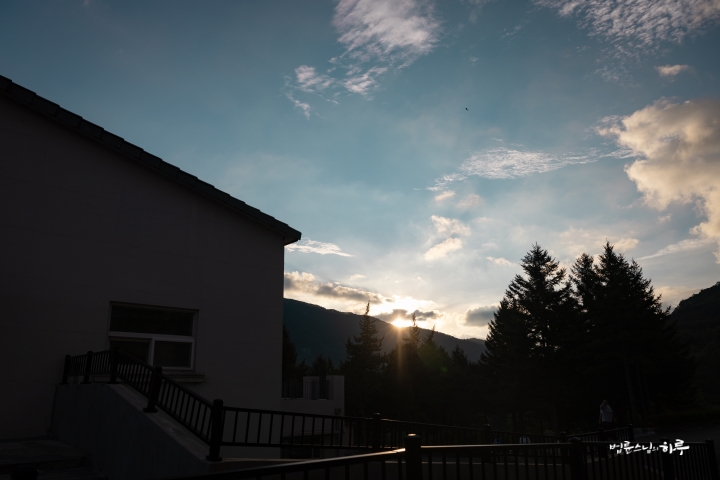
The young people from across the country returned to their homes, and after a simple dinner, Sunim departed from Seonyudong Education and Training Center at 5:30 PM heading for Seoul.
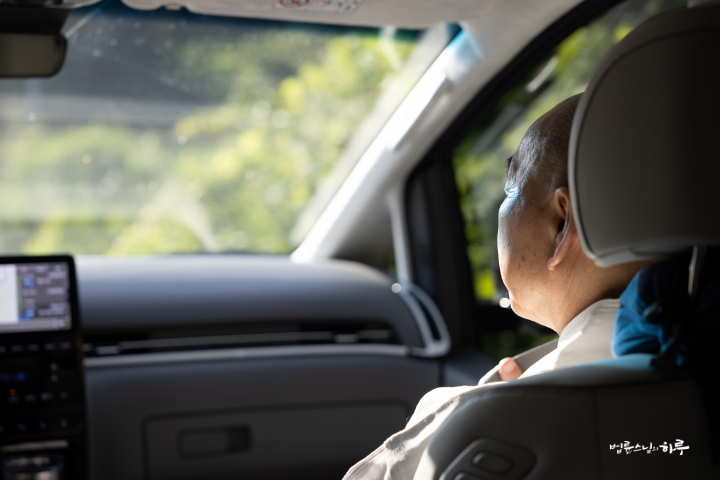
Although there were concerns about traffic on the last day of the holiday, fortunately there were no major delays. After driving on the highway for two hours, Sunim arrived at Seoul Jungto Center at 7:30 PM.
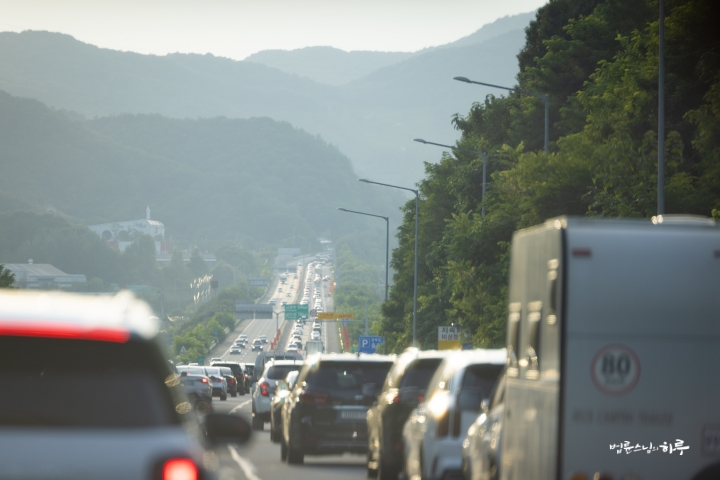
After sunset, Sunim spent the evening indoors proofreading manuscripts and handling various tasks before concluding the day’s activities.
Tomorrow, after visiting the hospital in the morning, Sunim will broadcast the weekday leading members’ Dharma assembly live. In the afternoon, he will meet with guests visiting The Peace Foundation, film an interview video to be shown at the Baek Yong-seong Independence Fighter Memorial Hall, and in the evening, broadcast the evening leading members’ Dharma assembly live.





